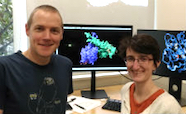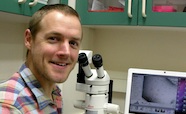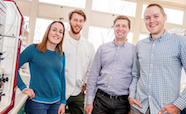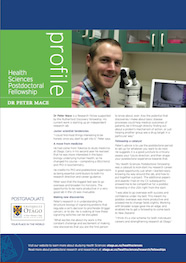Dr Peter Mace is a Senior Research Fellow with research funding from the Marsden Fund and the Health Research Council of New Zealand. He has previously been supported by the Rutherford Discovery Fellowship. He was interviewed in 2014 about his experience of being a postdoctoral fellow.
Junior scientist tendencies
“I could find most things interesting to be honest, once you start to get into it,” Peter says.
A move from medicine
He had come from Tokoroa to study medicine at Otago. Early in his second year he realised that he was more interested in the basic biology underlying human health, so he changed his course—completing a BSc(Hons) and PhD in biochemistry.
He credits his PhD and postdoctoral supervisors as being essential contributors to both his research direction and career guidance.
Peter says that the biggest test was to go overseas and broaden his horizons. The opportunity to be really productive in a very good lab in the US was invaluable.
Making new discoveries
Peter's research is in understanding the structural biology of signalling proteins that regulate a cell's decision to proliferate (trigger cancer), or to die. He is looking at how these signalling switches can be disrupted.
“What excites me about my work is the constant challenge and excitement of making new discoveries that you are the first person to know about, ever. Also the potential that discoveries I make about basic disease processes could help medical outcomes of patients, be it through directly finding out about a protein's mechanism of action, or just helping another group see a drug target in a particular way.”
Fellowship a catalyst
Peter's advice is to use the postdoctoral period to set up for whatever you want to do next. He suggests it is a good juncture to critically assess your future direction, and then shape your postdoctoral experience towards that.
“My Health Sciences Postdoctoral Fellowship was a catalyst to kick-start my research career. A great opportunity just when I started really knowing my way around the lab, and how to put together a project. The additional papers and awards I had on my CV subsequently, allowed me to be competitive for a postdoc fellowship in the USA right from the start.
“I was able to go overseas with success and confidence under my belt. This meant my postdoc overseas was more productive and allowed me to change fields slightly. Working with broader scope gave me an edge, and enabled me to get a fellowship to come back to New Zealand.
“I think it's a vital scheme for both individuals' careers and strengthening research at Otago.”
Read the extended interview with Peter
Peter's research news
Read about Peter's latest work:
Marsden Fund awarded
Inflammation or death via the ASK signalosome – why not both? $958,000
How does the body judiciously respond to challenges when the immune system is already on alert? Metabolic imbalances during obesity and diabetes chronically challenge the immune system, and further stressors that may be relatively benign can cause serious inflammatory disease.
University of Otago celebrates Marsden Fund success
Answers may lie in protein structure
 University of Otago scientists have unravelled the 3D structure of two proteins, potentially providing answers as to why some people may be at risk of developing specific cancers.
University of Otago scientists have unravelled the 3D structure of two proteins, potentially providing answers as to why some people may be at risk of developing specific cancers.
Otago discovery links DNA-packaging proteins and cancer development
HRC funding secured
Congratulations to Peter who was awarded a 2018 HRC grant of almost $1.2 million for his project Understanding regulation of the polycomb-repressive deubiquitinase in malignancy.
Almost $19 million awarded to Otago researchers in Health Research Council funding
Trans-Tasman collaboration sheds new light
 New light on a key factor involved in diseases such as Parkinson's disease, gastric cancer and melanoma has been cast through latest University of Otago research carried out in collaboration with Australian scientists.
New light on a key factor involved in diseases such as Parkinson's disease, gastric cancer and melanoma has been cast through latest University of Otago research carried out in collaboration with Australian scientists.
Otago discovery sheds new light on several disease processes
Taking testing to the field
 An engineered enzyme with the potential to create a simple method of testing for DNA mutations in the field — rather than in a lab — has won the 2016 Otago Innovation Limited Proof of Concept Grant competition.
An engineered enzyme with the potential to create a simple method of testing for DNA mutations in the field — rather than in a lab — has won the 2016 Otago Innovation Limited Proof of Concept Grant competition.
2016 Proof of Concept Grant winners announced
Early Career Award
 Six up-and-coming University of Otago staff have been announced as this year's recipients of Early Career Awards for Distinction in Research.
Six up-and-coming University of Otago staff have been announced as this year's recipients of Early Career Awards for Distinction in Research.
Early Career Awards bestowed upon outstanding researchers
New tool will accelerate research
 A new protein crystallography tool available to Otago researchers will help accelerate research into drug and vaccine design.
A new protein crystallography tool available to Otago researchers will help accelerate research into drug and vaccine design.
New tool to accelerate health research
Batten disease research
How do mutations of a gene affect protein function in the brain and cause Batten disease? Peter has attracted funding for this research.
Otago brain research supported by Neurological Foundation grants
HRC funding to explore breast cancer pathology
Peter's work on the role of the Trib1 pseudokinase in breast cancer pathology has secured a $1.128m grant in the June 2015 HRC funding round.
Innovative health research at Otago receives major funding
Troublesome tribbles
Dr Peter Mace has led trans-Tasman research that has created the first three-dimensional image of a key protein involved in the development of blood and other cancers.
- TV Interview with Peter Mace (39 Dunedin Television)
- Kiwi scientist unlocks secrets of troublesome protein (NZ Herald)
- Researchers unlock secrets of troublesome Tribble protein (University of Otago news)
